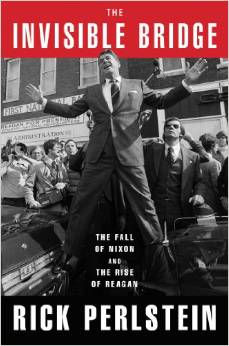Rick Perlstein's new book on Nixon and Reagan wins praise in double NYT reviews
Related Link HNN's Ongoing Coverage of the Conservative Charge that Perlstein Plagiarized Material
The lead article in this Sunday's New York Times Book Review is Frank Rich's appraisal of Rick Perlstein's The Invisible Bridge: The Fall of Nixon and the Rise of Reagan. This pretty much sums up the evaluation:
It says much about Perlstein’s gifts as a historian that he persuasively portrays this sulky, slender interlude between the fall of Nixon and the rise of Reagan (as his subtitle has it) not just as a true bottom of our history but also as a Rosetta stone for reading America and its politics today. It says much about his talent as a writer that he makes these years of funk lively, engrossing and on occasion mordantly funny. Perlstein knows how to sift through a culture’s detritus for the telling forgotten detail. Leave it to him to note that the WIN buttons peddled by Ford to promote a desperate “Whip Inflation Now” campaign were “designed by the same guy who invented the yellow ‘smiley face.’ ” Or to recall that the Republican Party tried to combat its dire post-Watergate poll numbers by producing “Republicans Are People Too!,” three fund-raising network television specials starring “everyday Republicans who want to tell why they have stuck with the G.O.P.” Competing against “M*A*S*H” in prime time, the second installment brought in $5,515. The third never ran.
Frank Rich compares Perlstein to Robert Caro, the author of a similarly long multi-volume series on American politics:
Caro’s promised final installment will pick up roughly where Perlstein’s first ends, with Johnson’s 1964 landslide defeat of Barry Goldwater. The writers’ chosen turfs and techniques are antithetical, however. Caro’s protagonist is our last unabashedly liberal president. Perlstein’s focus is the modern conservative movement that rose in reaction to the New Deal and Great Society. Caro is a relentless reporter who tracks down primary sources, human and otherwise. Perlstein is an obsessive researcher who often relies (and fully credits) the writers who did the investigative spade work before him. He doesn’t break news. It’s his insights that are the news, and have been since his first book, “Before the Storm: Barry Goldwater and the Unmaking of the American Consensus” (2001), which was sound enough to persuade conservative readers that a writer with liberal sympathies could write a revealing and balanced history of his ideological opposites.
In passing Rich observes that Perlstein's book is perhaps more detailed than it needs to be. In the main pages of the paper Jonathan Martin agrees, but like Rich, otherwise finds the book persuasive, stimulating, and original.
One of Perlstein's chief themes, to which he comes back again and again, is that the mainstream media and both political parties were out-of-touch with a sizable chunk of the American electorate, writing off as crazy many of the people who ended up voting for Reagan. The Times, they note, even wrote off Reagan himself. At age 65 he was, the NYT proclaimed in 1976, too old to consider running for president again.
